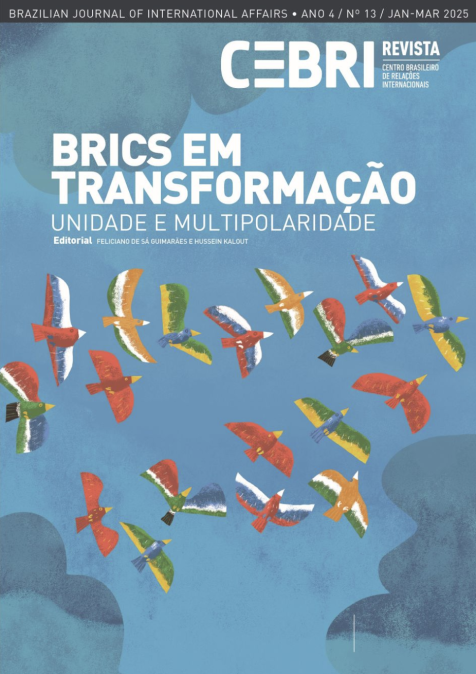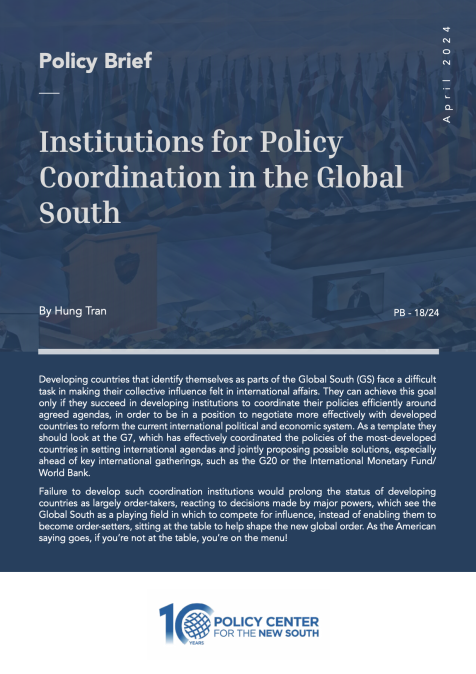This episode explores Africa's role amid a shifting global order marked by fragmentation and competing blocs. It examines whether African states are passive responders or active shapers of new strategic alignments like BRICS+ and South–South cooperation. The discussion also addresses Africa’s push for reform in multilateral institutions and the emergence of potential continental consensus. Looking ahead, the episode highlights key challenges and opportunities defining Africa’s strategic trajectory over the next decade.
RELATED CONTENT
-
 AuthorsJune 13, 2025This Paper was originally published on cebri.org Within an ever-evolving system of multilateral development banks (MDB) currently reshaped by four structural geo-economic trends, the emergence of new MDBs like the Asian Infrastructure Investment Bank (AIIB) and the New Development Bank (NDB) carries great geopolitical significance. Yet the new MDBs, attuned to institutional and operational realities, have not upended the MDB system. Their relationship with long-e ...
AuthorsJune 13, 2025This Paper was originally published on cebri.org Within an ever-evolving system of multilateral development banks (MDB) currently reshaped by four structural geo-economic trends, the emergence of new MDBs like the Asian Infrastructure Investment Bank (AIIB) and the New Development Bank (NDB) carries great geopolitical significance. Yet the new MDBs, attuned to institutional and operational realities, have not upended the MDB system. Their relationship with long-e ... -
AuthorsApril 17, 2025This policy brief explores the transformative role of BRICS as a platform for Global South cooperation and an emerging alternative to Western-dominated governance frameworks. Established with a shared goal of reforming international institutions and addressing global decision-making imbalances, BRICS has evolved from an economic concept into a multifaceted alliance that spans finance, diplomacy, development, and security. As the global order shifts towards multipolarity, BRICS has p ...
-
AuthorsMarch 14, 2025The traditional model of Official Development Assistance (ODA) has not only entrenched financial dependence but also served as a tool for geopolitical influence, often prioritizing donor interests over genuine economic self-sufficiency in developing nations. The 2015 Sustainable Development Goals (SDGs) envisioned a shift towards private investment, but this strategy has largely failed. Capital flight, rising debt burdens, and systemic financial asymmetries have ensured that investm ...
-
AuthorsApril 22, 2024Developing countries that identify themselves as parts of the Global South (GS) face a difficult task in making their collective influence felt in international affairs. They can achieve this goal only if they succeed in developing institutions to coordinate their policies efficiently around agreed agendas, in order to be in a position to negotiate more effectively with developed countries to reform the current international political and economic system. As a template they should l ...
-
 AuthorsImane LahrichApril 8, 2024Breaking Bonds, Forging Alliances On January 28, 2024, the military leaders of Niger, Mali, and Burkina Faso declared their joint intention to exit the Economic Community of West African States (ECOWAS), presenting three substantial criticisms against the regional organization. Their foremost claimed grievance was that ECOWAS has departed from its foundational vision, implying that foreign influences have diverted the regional organization from its essential values to the detriment ...
AuthorsImane LahrichApril 8, 2024Breaking Bonds, Forging Alliances On January 28, 2024, the military leaders of Niger, Mali, and Burkina Faso declared their joint intention to exit the Economic Community of West African States (ECOWAS), presenting three substantial criticisms against the regional organization. Their foremost claimed grievance was that ECOWAS has departed from its foundational vision, implying that foreign influences have diverted the regional organization from its essential values to the detriment ... -
November 22, 2023As part of the webinar series: “The Global Economy in Transition : Implications for Developing Countries”, the Policy Center for the New South is organizing a webinar titled: " The Future of Central Banks in Emerging Markets and Developing Countries” to contribute to the ...
-
 AuthorsAugust 29, 2023At the August 22-24 BRICS summit in Johannesburg, the leaders of Brazil, Russia, India, China and South Africa said they wanted to use more of their national currencies for cross-border payments, which are currently dominated by the U.S. dollar and other global convertible currencies. Like China and the other BRICS, several other countries have also sought to develop alternative external payment mechanisms. Pairs of countries have agreed to settle commercial and financial transactio ...
AuthorsAugust 29, 2023At the August 22-24 BRICS summit in Johannesburg, the leaders of Brazil, Russia, India, China and South Africa said they wanted to use more of their national currencies for cross-border payments, which are currently dominated by the U.S. dollar and other global convertible currencies. Like China and the other BRICS, several other countries have also sought to develop alternative external payment mechanisms. Pairs of countries have agreed to settle commercial and financial transactio ... -
June 27, 2023تعتبر مجموعة "بريكس" تكتلا اقتصاديا عالميا بدأت فكرة تأسيسه في شتنبر 2006، حينما عُقد أول اجتماع وزاري لوزراء خارجية البرازيل وروسيا والهند والصين على هامش أشغال الجمعية العامة للأمم المتحدة إضافة إلى انضمام جنوب أفريقيا رسميا سنة 2011. حيث أصبحت مجموعة بريكس أحد أهم التكتلات الاقتصادية...
-
Imane Lahrich & Hafez GhanemMay 09, 2023 على ضوء الاجتماعات السنوية لمجموعة البنك الدولي وصندوق النقد الدولي في التقرير الأخير لصندوق النقد الدولي حول آفاق الاقتصاد العالمي، والذي يطبعه القلق الزائد في ظل اضطرابات القطا ...
-
May 8, 2023In March 2023, the brutal demise of the Silicon Valley Bank (SVB) was the first to happen as a result of the hiking of interest rates that central banks started implementing from late 2021 onwards. Although the Federal Deposit Insurance Corporation (FDIC), a US government corporation pr...






